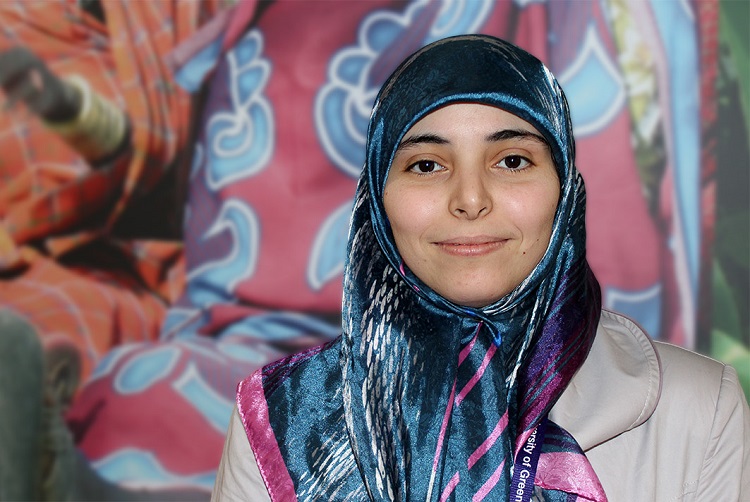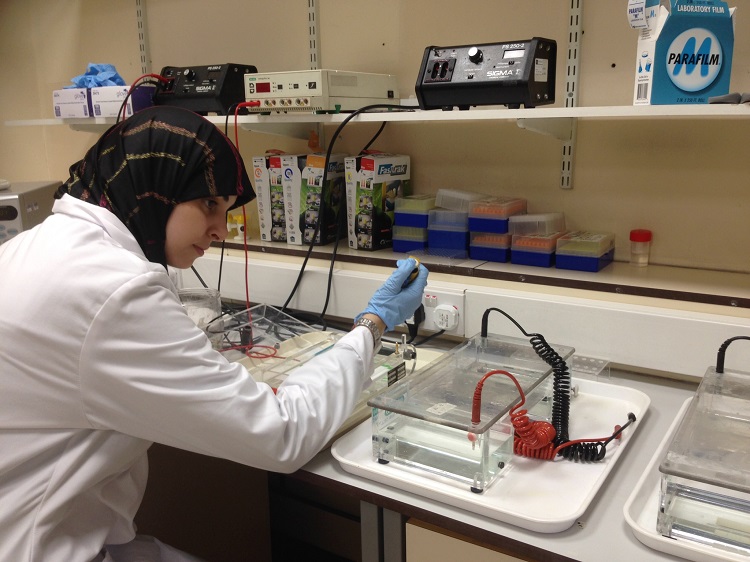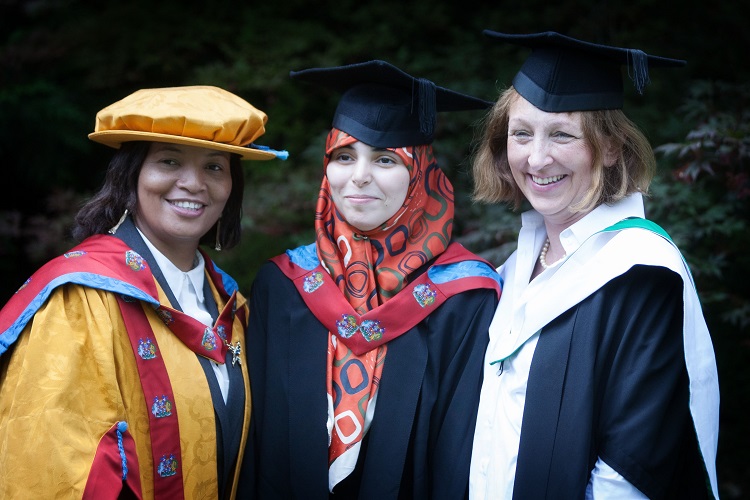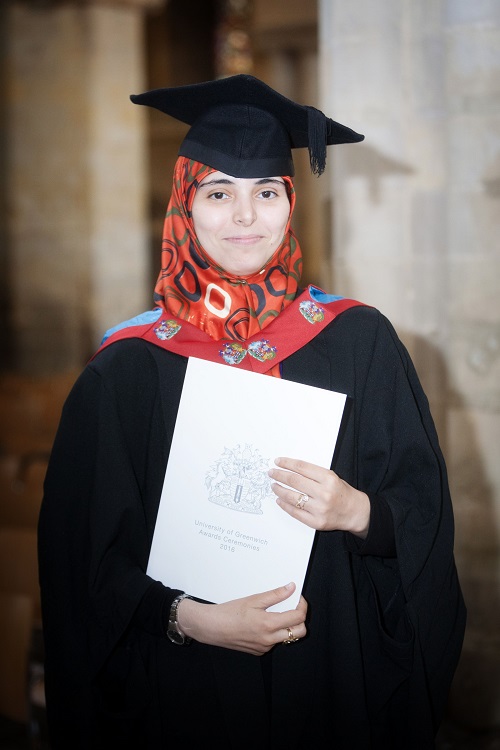
Meet Hajar el Hamss, current PhD student at NRI whose work focuses on the interactions between whitefly, the bacteria inside whitefly, and a virus causing a devastating disease affecting the tropical root and important food security crop, cassava. Today, it is Hajar’s turn to be under the microscope as we take a close look at her career path and explain her passion for solving scientific puzzles.
Hajar describes her home city of Fes as ‘the scientific capital of Morocco’. It is also home to some of the world’s oldest educational institutions – a fitting location to begin her scientific career. Hajar’s early interest in science was accompanied by a curiosity for many subjects; after sixth form, she applied to study subjects ranging from architecture to medicine to agriculture. Here, fate intervened, for her exam results suggested that an advanced degree in agriculture would be the best path for her – so she enrolled in Morocco’s National School of Agriculture.
Disease has a high impact on crop production, which has a high impact on the farmers. I want to search for solutions to such problems. I see a problem, I want to solve it, so I go to the lab to try and understand the biology of the disease.
In Morocco, almost half of the land is countryside, and approximately 40 percent of the population work in agriculture. For Hajar, however, studying agriculture was taking a step into the unknown – her family background is in academia, and she was unsure about the subject as she began her studies.
This initial uncertainty disappeared over the course of her degree, and she found the right specialism for her: plant disease. Her dissertation focussed on fire blight disease in apples and pears, and how it travels from tree to tree via bees. But what is it about disease that captures her attention?
 In Hajar’s words, “Disease has a high impact on crop production, which has a high impact on the farmers. I want to search for solutions to such problems.” Hajar’s enthusiasm about her subject is infectious as she continues, “I see a problem, I want to solve it, so I go to the lab to try and understand the biology of the disease”. During this period, she met farmers for the first time in her life – discussing with them problems such as disease control and access to certified seed. “With the scientific and practical understanding of disease, you can control it – a result that will be good for farmers.” She has kept in touch with these farmers ever since.
In Hajar’s words, “Disease has a high impact on crop production, which has a high impact on the farmers. I want to search for solutions to such problems.” Hajar’s enthusiasm about her subject is infectious as she continues, “I see a problem, I want to solve it, so I go to the lab to try and understand the biology of the disease”. During this period, she met farmers for the first time in her life – discussing with them problems such as disease control and access to certified seed. “With the scientific and practical understanding of disease, you can control it – a result that will be good for farmers.” She has kept in touch with these farmers ever since.
After her degree, Hajar moved to London with her husband, where she spent the first challenging year learning English and getting to know her community. She also got to know the University of Greenwich campus, close to her first home in London – and she decided to apply for a Master’s in Agriculture for Sustainable Development at the University’s Natural Resources Institute, NRI. She was accepted on the programme then moved to Chatham with her husband and 10 month-old daughter, to be close to the Medway campus in Kent where NRI is located. Hajar really lives up to her name, which means ‘one who migrates a lot’.
I liked all the courses without exception. I enjoyed all the lectures and I especially liked learning about the work and experience of the lecturers.
Hajar’s experience of the one-year Master’s in Agriculture for Sustainable Development was very positive. In her own words she says, “I liked all the courses without exception. I enjoyed all the lectures and I especially liked learning about the work and experience of the lecturers.” About the course structure she says, “It’s not all exams! The programme is good as it’s varied and there’s a mixture of essays and presentations.” Hajar focussed closely on her work and took advantage of the opportunity to ask questions and interact with her tutors as much as possible. Making friends was a little more challenging, though she quickly found the solution by getting to know the students on the Master’s in Sustainable Environmental Management, with whom she shared some courses.
 The Master’s combines six months of classroom-based learning and six months for completion of a research project. To choose a topic for this project, Hajar first met with NRI’s David Grzywacz, specialist in biological crop protection, leader of the Integrated Pest Management course and research project tutor. He encouraged students to focus on developing new skills, and working on established research interests, familiar crops or agricultural systems. Cassava is not a well-known crop in Hajar’s native Morocco, so how did she choose a topic involving a disease affecting the crop, known as Cassava Brown Streak Disease (CBSD)? Hajar knew that she had a strong liking for lab work, so David Grzywacz suggested that she work on techniques that could be transferable across crops, diseases and vector species. Remembering how she chose her topic, Hajar really lights up and her passion for her work is evident.
The Master’s combines six months of classroom-based learning and six months for completion of a research project. To choose a topic for this project, Hajar first met with NRI’s David Grzywacz, specialist in biological crop protection, leader of the Integrated Pest Management course and research project tutor. He encouraged students to focus on developing new skills, and working on established research interests, familiar crops or agricultural systems. Cassava is not a well-known crop in Hajar’s native Morocco, so how did she choose a topic involving a disease affecting the crop, known as Cassava Brown Streak Disease (CBSD)? Hajar knew that she had a strong liking for lab work, so David Grzywacz suggested that she work on techniques that could be transferable across crops, diseases and vector species. Remembering how she chose her topic, Hajar really lights up and her passion for her work is evident.
There are so many interactions! And so many unanswered questions: why is there a high abundance of whiteflies in Africa? Why are they doing so well? What exactly are the interactions between the virus and the bacteria? It’s like a big puzzle, and I never get bored, trying to work it out.
“I’m specifically interested in that!” she exclaims, going into details about her work on the interactions between the insect vector whitefly, the virus CBSD and the endosymbiont bacteria inside the whitefly. “There are so many interactions!” she continues, “And so many unanswered questions: why is there a high abundance of whiteflies in Africa? Why are they doing so well? What exactly are the interactions between the virus and the bacteria? It’s like a big puzzle, and I never get bored, trying to work it out.”
Her enthusiasm for her chosen subject matched the hard work she put in, working over weekends to complete the data collection. She was supported throughout her thesis by her supervisor, NRI’s Maruthi Gowda, Professor of Molecular Plant Pathology, with additional help from then PhD student, Saptarshi Ghosh, who helped and encouraged her with her lab work.
Hajar’s hard work and dedication paid off as she formally graduated from her Master’s in July 2016, where she was awarded the Prize for Best Dissertation on the Master’s in Agriculture for Sustainable Development.
 Shortly after completing her MSc, Hajar was invited to an interview for a PhD studentship at NRI, as part of the African Cassava Whitefly Project – a major NRI-run project involving multiple research organisations from more than ten countries, funded by the Bill & Melinda Gates Foundation. The project is investigating the causes of whitefly outbreaks in East and Central Africa, in order to develop sustainable control solutions. The interview panel included the Whitefly project leader Professor John Colvin, Professor Gowda, whose team is identifying cassava varieties resistant to whiteflies, and Dr. Hélène Delatte of CIRAD (the French agricultural research for development organisation), whose expertise is on the biology, population genetics, and interactions of endosymbiont bacteria. Hajar was sure to prepare thoroughly for this, her first ever interview.
Shortly after completing her MSc, Hajar was invited to an interview for a PhD studentship at NRI, as part of the African Cassava Whitefly Project – a major NRI-run project involving multiple research organisations from more than ten countries, funded by the Bill & Melinda Gates Foundation. The project is investigating the causes of whitefly outbreaks in East and Central Africa, in order to develop sustainable control solutions. The interview panel included the Whitefly project leader Professor John Colvin, Professor Gowda, whose team is identifying cassava varieties resistant to whiteflies, and Dr. Hélène Delatte of CIRAD (the French agricultural research for development organisation), whose expertise is on the biology, population genetics, and interactions of endosymbiont bacteria. Hajar was sure to prepare thoroughly for this, her first ever interview.
Her application was successful and she is now a PhD student at NRI, happily continuing her studies into whiteflies, bacteria and cassava disease, with the same supervisor, Professor Gowda. She is proud to be part of the Whitefly project – which she sees as both a big opportunity and a great responsibility – to work harder, obtain good results, and publish excellent articles. She enjoys meeting PhD students from other labs and the opportunity to meet face-to-face with world-renowned professors whose work she had previously read in journal articles.
In November 2016, the African Cassava Whitefly Project 2nd Annual Meeting will take place in Blantyre, Malawi. This will be Hajar’s first trip to Malawi, a trip which heralds a number of other ‘firsts’ – it will be the first time she will see both cassava and whiteflies in the field, the first time she will carry out field sampling on whiteflies, and the first time she will formally present her work at an international conference.
Through her hard work, dedication, focus and drive, it is certain that these experiences will be the first of many for Hajar.
Links: Apply for Agriculture for Sustainable Development, MSc | Study a PhD at NRI, University of Greenwich

